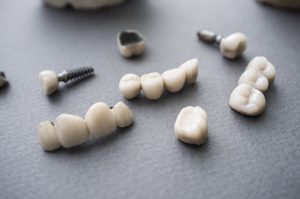Don’t Let Teeth Drift! Address Your Tooth Loss with a Dentist
 Millions of Americans are missing teeth, but that doesn’t mean it should be considered a normal part of your oral health. When teeth are lost, many aspects of your oral health begin to change. Some begin more suddenly, while others are more noticed in the long-term. Either way, putting off your replacement treatment is only going to allow your oral health to worsen over time.
Millions of Americans are missing teeth, but that doesn’t mean it should be considered a normal part of your oral health. When teeth are lost, many aspects of your oral health begin to change. Some begin more suddenly, while others are more noticed in the long-term. Either way, putting off your replacement treatment is only going to allow your oral health to worsen over time.
Instead, consider your options for replacing your missing teeth and rebuilding your smile with a dentist!
The Consequences of Missing Teeth
The moment your tooth is removed, your jawbone begins to shrink. As a result, this makes it more difficult to chew and break down foods, leading to potential digestive problems later. As your jaw begins to shrink, it also loses a large amount of it’s biting force. Without it, you can’t chew tough foods like apples or steak with the same confidence you had before the tooth loss.
Additionally, remaining teeth don’t just stay in place when neighboring teeth are extracted. They actually begin to shift into the empty space to compensate, causing your bite to become significantly misaligned. Misaligned teeth do not only look less appealing, but they are more likely to rub up against each other as you chew. If you want to reduce your risk of enamel erosion, filling the gaps in your smile is crucial.
Finally, uneven bites also cause disproportionate force on your oral structures, such as your jaw joints. These joints become overworked as a result of the additional force, which can lead to TMJ disorder. This chronic condition carries many symptoms, including jaw pain, lockjaw, headaches and pain in the upper back, neck and ears.
Bridges vs. Dental Implants
Tooth replacements come in two common forms: dental bridges and dental implants.
Dental bridges are the more traditional route for tooth replacement and are effective at replacing anywhere from three to four teeth at a time. They require no surgery to place, however they do require some removal of enamel for a restoration to fit on top of existing teeth.
In contrast, dental implants are ideal for replacing both single and multiple teeth. They use titanium posts which are placed directly inside the jawbone. Not only do implants require surgery, but substantial alveolar (jaw) bone for proper integration. Additionally, those considering implants can have them fitted with a bridge restoration. Instead of buffing down existing teeth, the implants themselves act as an anchor.
Which One Should You Choose?
Overall, dental implants are the most recommended option for a variety of reasons, including the following:
- A longer-lasting solution (averaging 25 years to a lifetime)
- The most natural solution to tooth loss
- Fully restored biting force, blood flow and bone stimulation (which provides easier biting, better retained facial structure, and a strong jawbone)
- Better durability and reliability
- The most cost-effective solution for tooth loss
Dentists always want to retain natural tooth structure if possible, so keep this mind during your next scheduled appointment!
About Fort Dental
Fort Dental’s dentists are experts when it comes to restoring the structural integrity of compromised teeth. All of them are qualified to place bridges and implants, as well as create custom-made restorations. To learn more about the tooth replacement process, you can contact them through their website.

